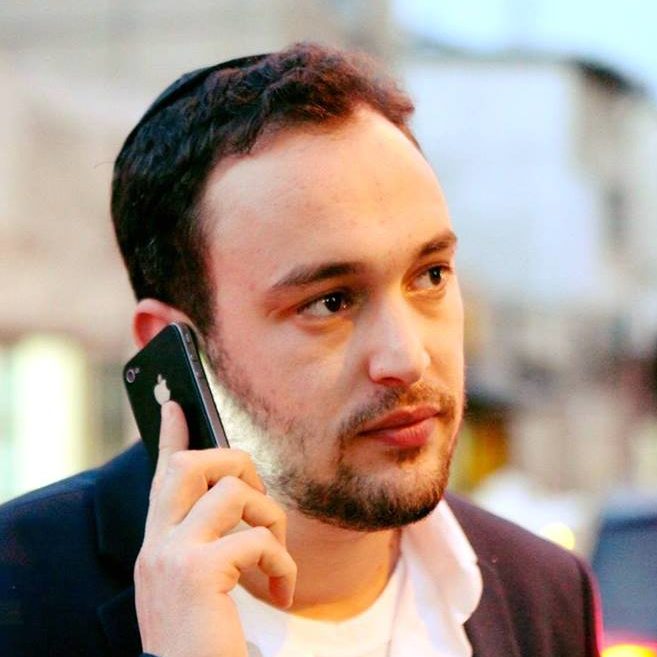Fine-Tuned


MUSIC TO HIS EARS For Greenberger glitter and glitz are anathema — he’s happiest in the beis medrash where the holy sources provide the most eloquent expression of his own soul’s yearnings (Photos: Shlomi Cohen)
M eshulam Greenberger is not your typical publicity-savvy chassidic music professional and chances are you’ve never even heard of him. He doesn’t do weddings or promotional videos will only sing at Torah events and he has no internet access so he can’t even watch himself in clips others have made and posted. But even if the name isn’t familiar certainly his music is. He’s written hundreds of niggunim and who doesn’t know the new “Kad Yasvun ” the fast-beat “Nodeh Lecha ” the Purim classic “Im Al Hamelech Tov ” Avraham Fried’s “Ein Kelokeinu ” and the hartzig ode to King David’s chesed “Dovid Hamelech Alav Hashalom”?
Greenberger a 35-year-old Yerushalmi avreich and chassid of the Dushinsky court says that being disengaged from the industry hype is actually an advantage for him — it keeps him focused on what’s really important and protects him from the entrapments of ego and self-aggrandizement. “I was once approached by a wealthy chassid who ordered some music for a private affair. He told me that I was advancing much too slowly in terms of technology upgrade. I told him halevai that I could advance even slower. True it’s hard to survive in the music world without being in the ‘mix.’ Nevertheless I prefer to stay where I am now. The last thing I want is to become a ‘star.’ ”
It’s not surprising that few have heard of Meshulam Greenberger. He’s soft-spoken and self-effacing shunning fame and publicity. Obviously uncomfortable with a reporter’s prying questions and the ongoing click of the camera which seemed to make him shrink into himself it wasn’t easy to convince him to agree to an interview — his first in mainstream Jewish media.
We met on the heels of the release of his new album Oischa Avakesh sitting together in the small studio near his home in Jerusalem’s Beis Yisrael neighborhood which abuts Meah Shearim. The new album is a masterful production reflecting Greenberger’s many-faceted skills and showcasing him not only as a prolific composer but as a vocalist as well. It’s not the first album in which he actually sings his own compositions although he’s passed many of his songs to other artists over the years. He released Besifarto in 2006 and proved himself as a voice of authentic chassidic niggun with the albums Hisoreri (niggunei Koson) and Niggunei Yamim Noraim (of the Baal Shem Tov).
“To be able to touch the soul is a great privilege ” Reb Meshulam muses. “But it’s also a mission and entails tremendous responsibility. I’ve never thought of myself as an artist. I compose because I want to give the ancient words of Torah and Chazal a context and a way of connectability for this generation and it makes me happy to know that my music touches peoples’ hearts. Why would I want to become a famous celebrity?”
How then does he navigate the seeming contradiction — shying away from the limelight when music in fact is his life? “He’s different ” says well-known Israeli radio music host Yossi Gil an encyclopedic expert on both old and new Jewish music who’s joined us in Greenberger’s studio. “I’ve never seen such a thing. A master composer who absolutely refuses to let the glitz get into his head.”
“What’s so strange?” asks Reb Meshulam. “I have no desire for fame and I don’t like all this show business.”
Giving Thanks Forever
Greenberger whose father Rav Yaakov Meir Greenberger is a rosh kollel in the Shomrei Hachomos network and a respected rav within the Dushinsky chassidus says he was drawn to music from the time he was a child. Considered a “yeled peleh ” he began singing at weddings when he was just nine years old but the real thrill was a year later when he was accepted into the choir of the chassidus.

“I can’t scream” Greenberger says. “And I don’t believe my voice has to impress anyone. My new album where I sing original compositions is really a reflection of my innermost journey into myself. It reflects my own personality without screaming or shouting”
“We performed on Chanukah for the hadlakah of the previous Rebbe zy”a both adults and children singing together” Reb Meshulam remembers. “For a chassidic boy standing and singing for the Rebbe is a totally different experience than performing for an audience. It impacts the most profound dimensions of the soul.”
Greenberger continued to study in the institutions of the chassidus but while in yeshivah he came to a fundamental realization that for him music was vital for his innermost being. “I was always composing ” he recalls. “I would think of a tune record it then add the lyrics.”
In 2000 when he was 19 Greenberger composed his first popular hit. At the time he went to Weberman’s studio in Meah Shearim put a few songs on a cassette and made a hundred copies for his friends. Somehow people heard the first song on the tape with the words of Tehillim 79 — “Va’anachnu amcha v’tzon marisecha nodeh lecha l’olam.” The song spread to both litvish and chassidic yeshivos and beyond all the way to the national-religious circles.
“At first it wasn’t so widespread because it was a private recording ” Greenberger shares. “But I did send one cassette to Reb Yosef Tzvi Brayer one of the composers for the Belzer Rebbe. He asked me to send another cassette to master producer Reb Yosef Moshe Kahana who immediately asked to buy the song.”
Kahana bought “Nodeh Lecha” for four hundred dollars which was the first professional validation of Greenberger’s composing abilities. A year after that Kahana produced his second album from the Mesikus series which he called Nodeh Lecha — he chose Greenberger’s niggun as the lead song and had the composer sing it together with child soloist Yoel Teichman. Greenberger also composed the final song on the album a lively instrumental niggun arranged by Mona Rosenblum — and quite an impressive creation for the young yeshivah man who had little formal training and couldn’t even read music. The niggun is no simple D-minor- A-minor-G sequence but a sophisticated symphony with klezmer-like sound and several complex transitions that listeners could surely assume was written by someone with a classical music background.
Greenberger was already married and learning in kollel when “Nodeh Lecha” was first released in 2002. Fifteen years later he’s still learning full-time juggling the world of music that inspires him with the life of the beis medrash that keeps him grounded and focused on eternal aspirations. (Excerpted from Mishpacha Issue 660)
Oops! We could not locate your form.













